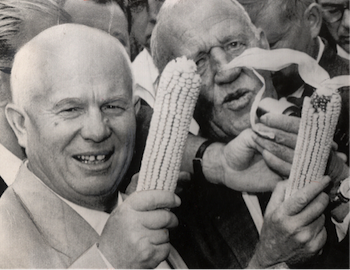

|
Khrushchev  Khrushchev in America with an Iowa farmer. He was so impressed by the harvest that he tried to get maize to grow in unsuitable conditions in the Soviet Union. A flamboyant and impulsive character, Khrushchev was born to a peasant family in Ukraine. He worked in mines and factories before joining the Red Army in the Civil War - a typical career path of the provincial Bolsheviks who hitched themselves to Stalin in the 1920s and rose through the Party ranks by carrying out his policies. Khrushchev was deeply implicated in the mass repressions of the 1930s, first as the Moscow Party boss in 1935-38, and then as Party chief of the Ukraine, when he oversaw the arrest of at least a quarter of a million people. Khrushchev copied Stalin's tactics during his rise to power between 1953 and 1956. Like his teacher, he built up his support among the regional party secretaries. He liberated them police supervision and gave them more autonomy from the Moscow ministries (where his rival Malenkov had his power base). To undermine his rivals he adopted a reform programme similar to Beria's. Talking of the need to restore Lenin's principles of 'socialist legality', he ordered a review of all cases involving 'counter-revolutionary crimes'. He took a special interest in the Leningrad Affair, in which his rival Malenkov had served as Stalin's main henchman. Several MGB officials linked to Malenkov were arrested. For his part in the Leningrad Affair, Malenkov himself was removed as the head of the government and put in charge of electricity. |
© 2014 Orlando Figes | All Rights Reserved